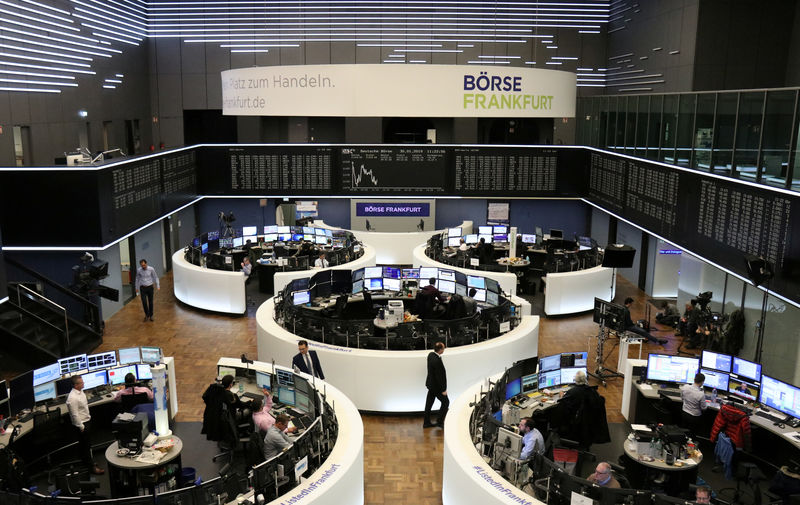By Ritvik Carvalho
LONDON (Reuters) - Global shares eased on Monday and the dollar hit a two-month high against a basket of currencies as markets counted down to a likely cut in U.S. interest rates this week, with much riding on whether the Federal Reserve signals yet more are to come.
After initially opening lower, European shares moved into positive territory with deal-making and a rally in defensive sectors pushing up the pan-European STOXX 600 index.
The dollar index - which measures the greenback against a basket of peers - was higher by 0.1% and at its highest since May 31.
A stronger-than-expected U.S. GDP report on Friday gave the dollar wings, as it led some investors to doubt whether the Fed will continue easing this year after its Wednesday meeting.
Interest rate futures are fully priced for a quarter-point rate cut from the Fed on Wednesday, with only a small chance of a half-point move.
More important will be what the central bank flags for the future, given the market implies 100 basis points of easing over the next year or so.
MSCI's All Country World Index of stocks, down by as much as 0.2% on the day, erased some losses to trade 0.05% lower.
"The week is off to a mixed start which isn't wholly surprising given just how much investors have to follow in what is typically a peaceful time of year," said Craig Erlam, senior market analyst at OANDA.
"There's no summer lulls just yet, with the Fed about to embark on an easing cycle, the BoE (Bank of England) offering its first assessment since Boris Johnson became PM, a third of S&P 500 and a quarter of Dow companies reporting second quarter earnings, the US jobs report being released and trade talks restarting between the US and China. As ever, this is almost entirely spread over four days so today may be the calm before the storm."
U.S. and Chinese trade negotiators meet in Shanghai this week for their first in-person talks since a G20 truce last month, but expectations are low for a breakthrough.
Data on the weekend showed profits earned by China's industrial firms contracted in June, fuelling concerns that the trade war will drag on economic growth.
"We remain cautiously optimistic that both sides can agree on a narrow agreement that addresses important trade-related issues, such as U.S. demands to increase exports," said analysts at Barclays (LON:BARC) in a note.
"That said, we are skeptical about the prospects of a broader agreement that includes the more challenging security-related issues."
In Asia, MSCI's broadest index of Asia-Pacific shares was half a percent lower. Japan's Nikkei dipped 0.2% and Shanghai blue chips 0.1%.
In bonds, euro zone bond yields dipped as jittery investors eyed more U.S.-China trade talks and waited for a likely U.S. Federal Reserve interest rate cut, after the European Central Bank's dovish signaling last week disappointed some.
The benchmark German 10-year Bund yield fell more than 1 basis point to -0.3910%, not far from the record low of -0.422% touched last week.
Elsewhere in currencies, sterling fell to a fresh 27-month low around $1.2325 amid reports the government of Prime Minister Boris Johnson was preparing the ground for a "no-deal" Brexit.
The euro was 0.1% lower at $1.111.
Spot gold was flat at $1,418.13 per ounce.
Oil prices fell as investors fretted over the outlook for global economic growth, while weekend talks between Iran and major powers ended on a generally positive note, suggesting an easing of tensions in the Middle East.
Brent crude futures eased 0.74% to $62.99, while U.S. crude lost 0.34% to $56.01 a barrel.
